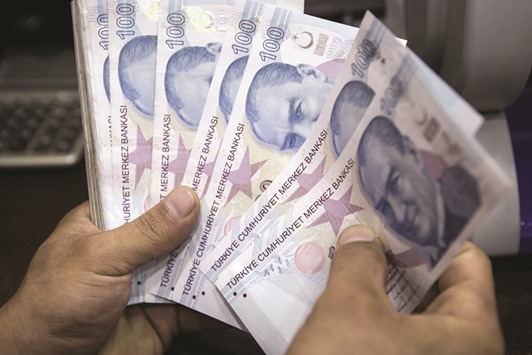Weakness in the Turkish lira could drive up prices and knock the central bank off its predicted inflation path in the first quarter of 2017, but the impact will depend on the pace of economic activity, governor Murat Cetinkaya said yesterday.
At a news conference on the bank’s monetary and exchange rate policy for 2017, Cetinkaya said the impact of forex volatility on inflation had so far been limited but upward risks to prices have increased.
“We think that the recent lira volatility will have an impact on inflation starting from the first quarter of 2017,” he said.”The risk of the forex rate impact driving us away from our expected and projected path in the first quarter is high.”
The lira has plunged to record lows in recent weeks, hit by a resurgent dollar and doubts about the outlook for domestic politics and security.
Cetinkaya did not give a specific inflation target for the first quarter, but the central bank’s forecast for inflation next year is 6.5%.
In November, annual inflation stood at 7.0%, below the bank’s 7.5% forecast for the end of the year.
The central bank hiked rates last month for the first time in almost three years, but this has done little to ease the pain caused by the lira’s slide.
The currency hit a low of 3.6 to the dollar last Friday and has only recovered a little since then, trading around 3.51 yesterday.
Cetinkaya said the forex “pass-through” — a measure of how sensitive prices are to changes in exchange rates — would depend on domestic demand and economic activity.
While lira weakness may push up inflation, weak growth could partially cancel that out.
“For the monetary policy outlook, it will be important to see which impact dominates the other in the medium term,” he said.
The bank’s rate decisions will remain dependent on the inflation outlook, Cetinkaya said. Some economists believe the bank has been too slow in hiking rates to defend the lira.
But President Tayyip Erdogan wants borrowing costs brought down to fuel growth, leaving the central bank in a difficult position.
Cetinkaya expected a rise in economic activity in the final quarter of this year and forecast that the contribution of exports to growth would increase in 2017, noting that a normalisation in ties with Russia would help.
He saw an upside risk to the bank’s inflation forecast for this year, including from tax hikes on tobacco and other products.

The lira has plunged to record lows in recent weeks, hit by a resurgent dollar and doubts about the outlook for domestic politics and security
